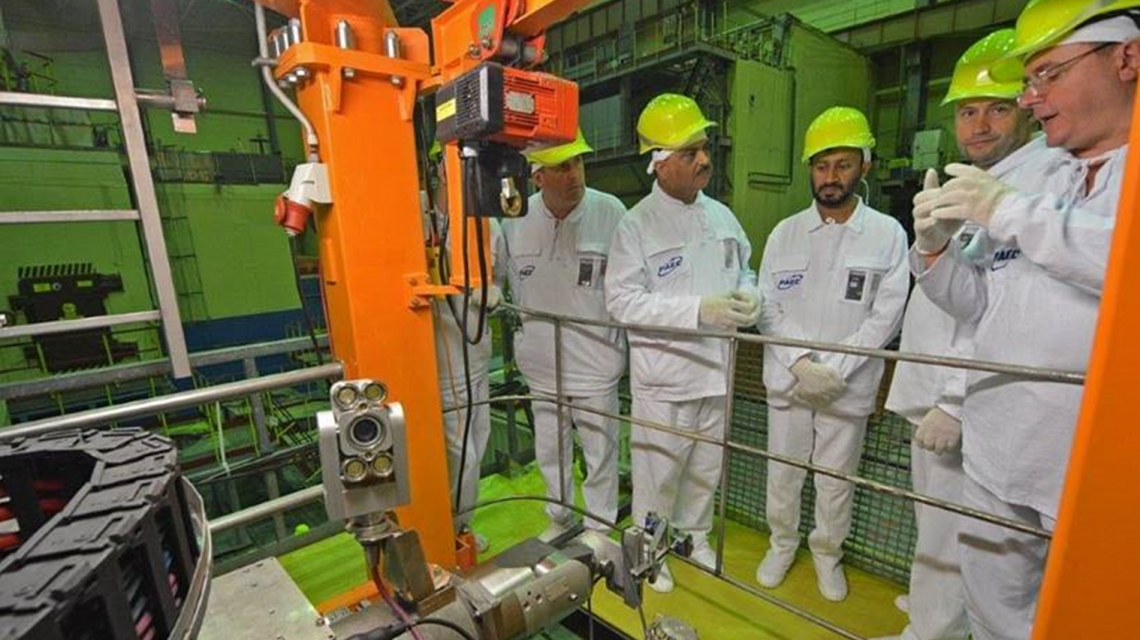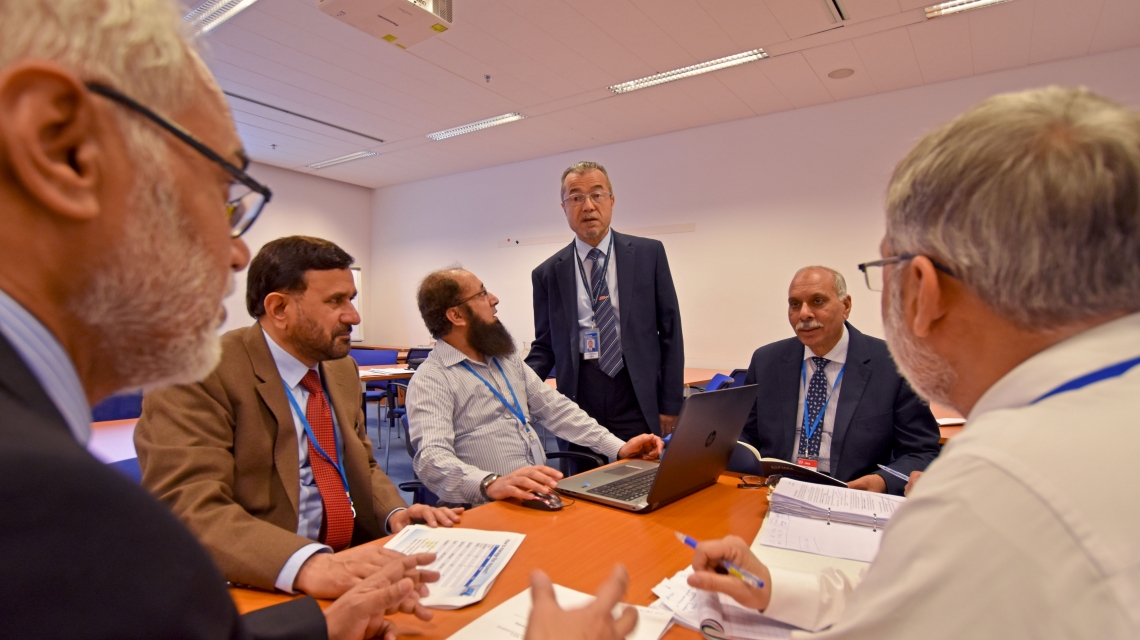Pakistan Streamlines its National Nuclear Power Programme with IAEA Support
Pakistan began operating its first commercial nuclear power
plant in 1972 and, today, operates five NPPs with plans to expand its
fleet of power plants. (Photo: O. Yusuf/IAEA)
As Pakistan seeks to significantly scale-up nuclear power to meet
the rising energy demands of a growing population, the South Asian
country has turned to the IAEA for support in strengthening its nuclear
power programme. Regulators, operators and representatives of
organizations involved in Pakistan’s nuclear power programme gathered at
the IAEA’s headquarters in Vienna last month to discuss the Agency’s
streamlined support for the country, which is aiming to expand its
nuclear power generating capacity more than six-fold over the next
decade, from 1430 MW to 8800 MW.
To facilitate this rapid expansion of nuclear power, the IAEA has amalgamated four of its pre-existing national technical cooperation projects—which supported the regulators, operators, waste managers and non-destructive testers involved Pakistan’s NPP programme —into a single project[1]. In doing so, the Agency is bringing together all the relevant stakeholders of the Pakistani nuclear power programme to streamline their workflows, reduce delays and costs, enhance cooperation and harmonize their safety and waste management approaches.
“Pakistan has benefited from the IAEA Safety Standards and other technical documents, but there is always room for the improvement,” said Ahmad Nadeem, Manager of the Technical Coordination Division of the Chashma Nuclear Power Plant. “In order to further improve the safety, reliability and sustainability of Pakistan’s nuclear power plants, we decided to approach IAEA for a comprehensive and integrated national project.”
To facilitate this rapid expansion of nuclear power, the IAEA has amalgamated four of its pre-existing national technical cooperation projects—which supported the regulators, operators, waste managers and non-destructive testers involved Pakistan’s NPP programme —into a single project[1]. In doing so, the Agency is bringing together all the relevant stakeholders of the Pakistani nuclear power programme to streamline their workflows, reduce delays and costs, enhance cooperation and harmonize their safety and waste management approaches.
“Pakistan has benefited from the IAEA Safety Standards and other technical documents, but there is always room for the improvement,” said Ahmad Nadeem, Manager of the Technical Coordination Division of the Chashma Nuclear Power Plant. “In order to further improve the safety, reliability and sustainability of Pakistan’s nuclear power plants, we decided to approach IAEA for a comprehensive and integrated national project.”

Experts
from Pakistan’s National Centre for Non-Destructive Testing visit the
Rivne Nuclear Power Plant in Varash, Ukraine to learn from the NPP
management experiences of analogues in the Europe region. (Photo: NCNDT)
Always improving
Pakistan has a long history of working with nuclear science, applications and power. It was the sixth country to ratify the IAEA Statute and, in doing so, provided one of the 18 ratifications required to bring the Statute, and hence the IAEA’s mandate, into force. Moreover, Pakistan’s national nuclear power programme has existed since the 1972 with the commissioning of the Karachi Nuclear Power Complex (KANUPP), and the country presently maintains a fleet of five commercial nuclear power plants, primarily in the northwest district of Mianwali and southeast district of Sindh, with plans to construct several new plants by 2050 to help accommodate growing energy demands.
The effective maintenance and, above all, safe and reliable operation of a national nuclear power programme will rely on the close and consistent collaboration of thousands of technical experts, government policy-makers and industry regulators. This collaboration is vital to building public awareness of, and confidence in, nuclear technology and in the professionals tasked with maintaining, regulating and deploying nuclear applications.
Pakistan has a long history of working with nuclear science, applications and power. It was the sixth country to ratify the IAEA Statute and, in doing so, provided one of the 18 ratifications required to bring the Statute, and hence the IAEA’s mandate, into force. Moreover, Pakistan’s national nuclear power programme has existed since the 1972 with the commissioning of the Karachi Nuclear Power Complex (KANUPP), and the country presently maintains a fleet of five commercial nuclear power plants, primarily in the northwest district of Mianwali and southeast district of Sindh, with plans to construct several new plants by 2050 to help accommodate growing energy demands.
The effective maintenance and, above all, safe and reliable operation of a national nuclear power programme will rely on the close and consistent collaboration of thousands of technical experts, government policy-makers and industry regulators. This collaboration is vital to building public awareness of, and confidence in, nuclear technology and in the professionals tasked with maintaining, regulating and deploying nuclear applications.

The
four-day meeting benefitted from the participation of nuclear
regulators, operators, NDT specialists and policy-makers from several
national Pakistani institutions. (Photo: O. Yusuf/IAEA)
Since the launch of
the newly-combined project in 2018, the IAEA has supported the country’s
efforts to train specialist staff, expand physical infrastructure and
increase national nuclear power generating capacity by organizing more
than 45 expert missions and national workshops, at which regulators and
operators reached a consensus on several operational matters, from the
timeliness of licensing and verification procedures to the manner in
which inspections are conducted.
Furthermore, the Agency supported the procurement of essential communication infrastructure—such as internet-connecting devices and equipment for the maintenance of an industry-wide intranet—to allow for information to move more seamlessly between government institutions, departments and agencies.
“Under the national project, the regulator, operator, non-destructive testing experts and waste managers have come under one umbrella,” explained Nadeem. “This approach has helped us to avoid the duplication of activities and to synergise the expertise available within the country.”
“The IAEA supported us by arranging a series of international expert missions and workshops, in which all the relevant national institutions participated in order to understand and learn about the international approaches for the resolution of issues [related to NPPs],” said Anis Memon, a Director of the Karachi Nuclear Power Complex. “The recommendations made as a result of these workshops and expert missions have helped to improve the integration and coordination of our workflows and decision-making processes.”
[1] PAK2007, ‘Strengthening and Enhancing Capabilities of Pakistan's National Institutions to Support a Safe, Reliable and Sustainable Nuclear Power Programme’
Furthermore, the Agency supported the procurement of essential communication infrastructure—such as internet-connecting devices and equipment for the maintenance of an industry-wide intranet—to allow for information to move more seamlessly between government institutions, departments and agencies.
“Under the national project, the regulator, operator, non-destructive testing experts and waste managers have come under one umbrella,” explained Nadeem. “This approach has helped us to avoid the duplication of activities and to synergise the expertise available within the country.”
“The IAEA supported us by arranging a series of international expert missions and workshops, in which all the relevant national institutions participated in order to understand and learn about the international approaches for the resolution of issues [related to NPPs],” said Anis Memon, a Director of the Karachi Nuclear Power Complex. “The recommendations made as a result of these workshops and expert missions have helped to improve the integration and coordination of our workflows and decision-making processes.”
[1] PAK2007, ‘Strengthening and Enhancing Capabilities of Pakistan's National Institutions to Support a Safe, Reliable and Sustainable Nuclear Power Programme’


No comments:
Post a Comment